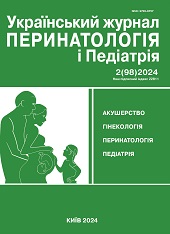Features of pregnancy management in a patient with recurrent miscarriage and post-traumatic stress disorder complicated by thyroid dysfunction: a clinical case
DOI:
https://doi.org/10.15574/PP.2024.98.128Keywords:
recurrent miscarriage, post-traumatic stress disorder, thyroid dysfunction, autoimmune thyroiditisAbstract
Recurrent Pregnancy Loss (RPL) remains one of the acute issues in modern obstetrics and gynecology. The etiology and causes of each pregnancy loss often cannot be identified. In Ukraine, a significant number of women of reproductive age have thyroid gland dysfunction, which requires attention to this problem not only from endocrinologists but also from gynecologists, especially in managing patients with unexplained RPL.
The aim was to study the etiology of RPL based on a clinical case study and to find out the relationship between certain types of endocrine dysfunction and post-traumatic stress disorder (PTSD), which in turn can significantly increase the risk of developing RPL. Such research is important for a deeper understanding of the causes and factors that increase the risks of RPL, allowing for more effective diagnostics and treatment in planning subsequent pregnancies for women at risk of miscarriage who have been diagnosed with PTSD.
Clinical case. The patient, a 27-year-old woman, was diagnosed with RPL after the loss of her third pregnancy. During her second unsuccessful pregnancy in 2020, she was diagnosed with autoimmune thyroiditis. In 2022, she experienced another pregnancy loss at 6 weeks during the occupation of the Kyiv region. Examinations revealed thyroid dysfunction, iron deficiency anemia, and PTSD. Comprehensive treatment and preconception preparation were conducted, including medication, psychotherapy, and health monitoring. The next pregnancy, confirmed in February 2023, resulted in a successful delivery in October 2023.
Conclusions. The clinical case presented demonstrates the necessity of detailed patient history collection in patients with RPL with mandatory assessment of thyroid function and consideration of psychological status. It also highlights the importance of correcting TSH levels already at the preconception stage, without waiting for early complications or threats to pregnancy.
The study was performed in accordance with the principles of the Declaration of Helsinki. Informed consent was obtained for the study.
No conflict of interests was declared by the authors.
References
Bussen S, Steck T. (1995). Thyroid autoantibodies in euthyroid non-pregnant women with recurrent spontaneous abortions. Human reproduction (Oxford, England). 10; 11: 2938-2940. https://doi.org/10.1093/oxfordjournals.humrep.a135823; PMid:8747048
Chester MR, Tirlapur A, Jayaprakasan K. (2022). Current management of recurrent pregnancy loss. The Obstetrician & Gynaecologist. 24: 260-271. https://doi.org/10.1111/tog.12832
De‐Regil LM, Peña‐Rosas JP, Fernández‐Gaxiola AC, Rayco‐Solon P. Effects and safety of periconceptional oral folate supplementation for preventing birth defects. Cochrane Database of Systematic Reviews 2015, Issue 12. Art. No.: CD007950. https://doi.org/10.1002/14651858.CD007950.pub3
ESHRE Guideline Group on RPL et al. (2023, Mar 2). ESHRE guideline: recurrent pregnancy loss: an update in 2022. Human reproduction open. 1: hoad002. https://doi.org/10.1093/hropen/hoad002; PMid:36873081 PMCid:PMC9982362
Gill JM, Saligan L, Woods S, Page G. (2009, Oct). PTSD is associated with an excess of inflammatory immune activities. Perspect Psychiatr Care. 45(4): 262-77. https://doi.org/10.1111/j.1744-6163.2009.00229.x; PMid:19780999
Li M, He Y, Mao Y, Yang L, Chen L, Du J et al. (2022, Sep). Preconception thyroid-stimulating hormone levels and adverse pregnancy outcomes. Clin Endocrinol (Oxf). 97(3): 339-346. Epub 2022 Jan 7. https://doi.org/10.1111/cen.14668; PMid:34951040
Pankiv VI. (2016, kviten). Vplyv dysfunktsii shchytopodibnoi zalozy na reproduktyvnu systemu zhinky. Suchasni mozhlyvosti fitoterapii. Reproduktyvna endokrynolohiia. 27: 52-57. https://doi.org/10.18370/2309-4117.2016.27.52-57
Pasiechko NV, Hnat SV. (2014). Porushennia reproduktyvnoi funktsii zhinky na tli dysfunktsii shchytopodibnoi zalozy (ohliad problemy). Mizhnarodnyi endokrynolohichnyi zhurnal. 4: 97-102
Reid SM, Middleton P, Cossich MC, Crowther CA, Bain E. Interventions for clinical and subclinical hypothyroidism pre-pregnancy and during pregnancy. Cochrane Database Syst Rev. 2013 May 31;(5):CD007752. PMID: 23728666. https://doi.org/10.1002/14651858.CD007752.pub3
Runkle I, de Miguel MP, Barabash A et al. (2021). Early levothyroxine treatment for subclinical hypothyroidism or hypothyroxinemia in pregnancy: the St Carlos gestational and thyroid protocol. Front Endocrinol. 12: 743057. https://doi.org/10.3389/fendo.2021.743057; PMid:34737722 PMCid:PMC8560890
Tsmur OV, Getsko NV. (2023). Thyroid function in pregnant women with thyroid peroxidase antibodies. Ukrainian Journal of Perinatology and Pediatrics. 4(96): 37-42. https://doi.org/10.15574/PP.2023.96.37
Downloads
Published
Issue
Section
License
Copyright (c) 2024 Ukrainian Journal of Perinatology and Pediatrics

This work is licensed under a Creative Commons Attribution-NonCommercial 4.0 International License.
The policy of the Journal “Ukrainian Journal of Perinatology and Pediatrics” is compatible with the vast majority of funders' of open access and self-archiving policies. The journal provides immediate open access route being convinced that everyone – not only scientists - can benefit from research results, and publishes articles exclusively under open access distribution, with a Creative Commons Attribution-Noncommercial 4.0 international license(СС BY-NC).
Authors transfer the copyright to the Journal “MODERN PEDIATRICS. UKRAINE” when the manuscript is accepted for publication. Authors declare that this manuscript has not been published nor is under simultaneous consideration for publication elsewhere. After publication, the articles become freely available on-line to the public.
Readers have the right to use, distribute, and reproduce articles in any medium, provided the articles and the journal are properly cited.
The use of published materials for commercial purposes is strongly prohibited.

